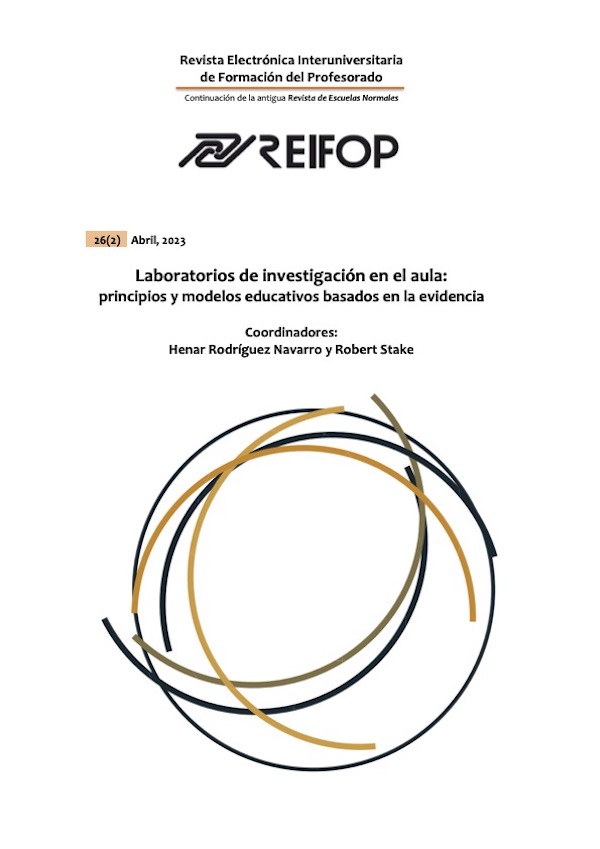The Interactive Research Methods Lab: A Hubfor the Promotion of Educational Changebased on Methodological Equity
Abstract
In this article we present the Interactive Research Methods Lab (IRML) as a hub that facilitates an empowering and emancipatory model leading to the promotion of educational change based on an emerging methodological equity approach. We describe the origins, evolution and key innitiatives of this innovative physical and virtual space in the Bagwell College of Education (Kennesaw State University) that challenges the traditional approaches to teaching and learning research methods, by promoting the development of a critical inquiry culture among pre-service and in-service teachers.
Downloads
-
Abstract709
-
PDF (Español (España))381
References
Banks, C.A., & Banks, J.A. (1995). Equity pedagogy: An essential component of multicultural education. Theory into Practice, 34(3), 152-158.
Breuer, F. & Schreier, M. (2007). Issues in learning about and teaching qualitative research methods and methodology in the social sciences. Forum Qualitative Sozialforschung, 8(1).
Bruce, B. C. (2009). Building an Airplane in the Air: The Life of the Inquiry Group. In B. Drayton & J. Falks (eds.), Creating and facilitating effective on-line professional development for educators. New York: Teachers College Press
Cooper, R., Fleischer, A., & Cotton, F. A. (2012). Building Connections: An Interpretative Phenomenological Analysis of Qualitative Research Students’ Learning Experiences. Qualitative Report, 17(1), 1-16. https://nsuworks.nova.edu/tqr/vol17/iss17/1
Darling-Hammond, L., Hyler, M. E., & Gardner, M. (2017). Effective Teacher Professional Development. Palo Alto, CA: Learning Policy Institute. Retrieved from: https://learningpolicyinstitute.org/sites/default/files/product-files/Effective_Teacher_Professional_Development_REPORT.pdf
European Commission (2016). Open innovation, open Science, open to the world: A vision for Europe. Brussels: European Commission, Directorate-General for Research and Innovation. doi:10.2777/061652
Groenewald, T. (2004). A phenomenological research design illustrated. International Journal of Qualitative Methods, 3(1), 1-26.
Gulamhussein, A. (2013). Teaching the Teachers: Effective Professional Development in an Era of High Stakes Accountability. Center for Public Education. Center for Public Education. Retrieved from: http://conference.ohioschoolboards.org/2017/wp-content/uploads/sites/17/2016/07/1pm111317A114Job-embedPD.pdf
Günter, M. (2008). A lesson learned? Difficulties in teaching and learning qualitative research methods. Journal Für Psychologie, 1(5).
Lesko, N., Simmons, J.A., Quarshie, A., & Newton, N. (2008). The Pedagogy of Monsters: Scary Disturbances in a Doctoral Research Preparation Course. Teachers College Record, 110 (8), 1541-1573. http://www.tcrecord.org/Content.asp?ContentId=15152
Mandinach, E. B. (2012). A perfect time for data use: Using data-driven decision making to inform practice. Educational Psychologist, 47(2), 71–85. DOI: 10.1080/00461520.2012.667064
Mitchell, L.S. (1931). A cooperative school for student teachers. Progressive Education, 8. 251-255.
Mulholland, R., McKinlay, A., & Sproule, J. (2017). Teachers in need of space: The content and changing context of work. Educational Review, 69 (2), 181-200. 10.1080/00131911.2016.1184131
Muñoz-Cristóbal, J. A. & Prieto, L. P., Asensio-Pérez, J. I., Martínez-Monés, A., Jorrín-Abellán, I. M., & Dimitriadis, Y. (2015). Coming Down to Earth: Helping Teachers Use 3D Virtual Worlds in Across-Spaces Learning Situations. Educational Technology & Society, 18 (1), 13–26. http://www.jstor.org/stable/jeductechsoci.18.1.13
Muñoz-Cristóbal, J., Jorrín-Abellán, I.M., Asensio-Pérez, J., Martínez-Mones, A., Prieto, L. & Dimitriadis, Y. (2015). Supporting Teacher Orchestration in Ubiquitous Learning Environments: A Study in Primary Education. Learning Technologies, IEEE Transactions on, 8(1), 83-97. doi: 10.1109/TLT.2014.2370634
Jorrín-Abellán, I.M. (2021) Hopscotch 4-Teachers (Version 1.0) [Web tool]. https://hopscotchmodel.com/4-teachers/
Jorrín-Abellán, I.M. (2021b, October 7). Playing Hopscotch to Generate Well-Informed SoTL Research Designs. [Plenary Workshop]. Scholarship of Teaching and Learning Summit. Atlanta, Georgia. https://facultydevelopment.kennesaw.edu/sotlsummit/
Jorrín-Abellán, I.M. & Steiner, H. (2021) Hopscotch 4-SoTL (Version 1.0) [Web tool]. https://hopscotchmodel.com/4-sotl/
Jorrín-Abellán, I. M., Fontana Abad, M., & Rubia Avi, B. (2021). Investigar en educación. Síntesis.
Jorrín-Abellán, I. M., Vasquez, A., & Gaines, R. E. (2020). Co-designing Research Methods Lesson Plans in the Interactive Research Methods Lab. Edutec. Revista Electrónica De Tecnología Educativa, (74), 51-71. https://doi.org/10.21556/edutec.2020.74.1797
Jorrín-Abellán, I.M. (2019). Rayuela 2.0: Una herramienta para promocionar la labor innovadora de maestros y maestras mediante la generación de diseños de investigación rigurosos. Revista Latinoamericana de Tecnología Educativa, 18 (1), 23-39. (view)
Jorrín-Abellán, I. M. (2019). Hopscotch 2.0: an enhanced version of the Model for the Generation of Research Designs in Social Sciences and Education. Georgia Educational Researcher, 16 (1). DOI: 10.20429/ger.2019.160103
Jorrín-Abellán, I. M. (2016). Hopscotch Building: A Model for the Generation of Qualitative Research Designs. Georgia Educational Researcher, 13(1) DOI: 10.20429/ger.2016.130104.
Jorrin-Abellán, I.M. (2012) Perfil Formativo generado en los entornos CSCL: Un Estudio de Caso. Editorial Académica Española, Saarbrücken, Germany, 2012. (Doctoral Dissertation)
Poole, G. (2013). Square one: What is research? In K. McKinney (Ed.) The scholarship of teaching and learning in and across the disciplines. Bloomington, IN: Indiana University Press.
Post, T. (2021). Teacher Experiences with Multiple One-to-One Technology Integration Models: A Phenomenography. Doctor of Education in Instructional Technology Dissertations. 10. https://digitalcommons.kennesaw.edu/instruceddoc_etd/10
Ratnam, T. (2020) Provocation to Dialog in a Third Space: Helping Teachers Walk Toward Equity Pedagogy. Frontiers in Education. 5:569018. doi: 10.3389/feduc.2020.569018
Stake, R. E. (2010). Qualitative Research: Studying How things work. New York: The Guilford Press.
Los artículos que se publican en esta revista están sujetos a los siguientes términos:
1. El Departamento de Métodos de Investigación y Diagnóstico en Educación de la Universidad de Murcia (España), junto con el Servicio de Publicaciones de la Universitdad de Murcia (Editum) son los editores de la revista REIFOP y conserva los derechos patrimoniales (copyright) de los artículos publicados, permitiendo la reutilización de las mismos bajo la licencia de uso indicada en el punto 2.
2. Las obras se publican en la edición electrónica de la revista bajo una licencia Creative Commons Reconocimiento-NoComercial-SinObraDerivada 3.0 España (texto legal). Se pueden copiar, usar, difundir, transmitir y exponer públicamente, siempre que: i) se cite la autoría y la fuente original de su publicación (revista, editores y URL de la obra); ii) no se usen para fines comerciales; iii) se mencione la existencia y especificaciones de esta licencia de uso.
3. Condiciones de auto-archivo. Se permite y se anima a los autores a difundir electrónicamente las versiones pre-print (versión antes de ser evaluada) y/o post-print (versión evaluada y aceptada para su publicación) de sus obras antes de su publicación, ya que favorece su circulación y difusión más temprana y con ello un posible aumento en su citación y alcance entre la comunidad académica. Color RoMEO: verde.















